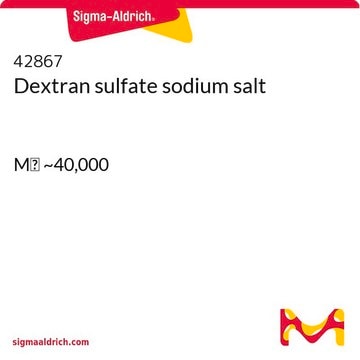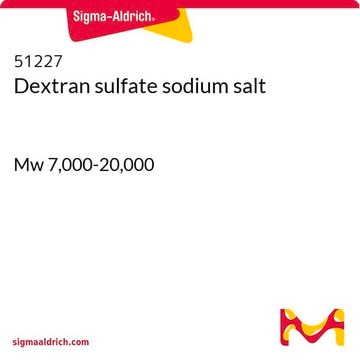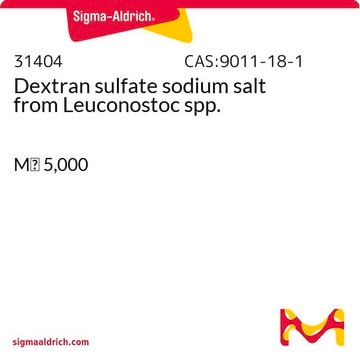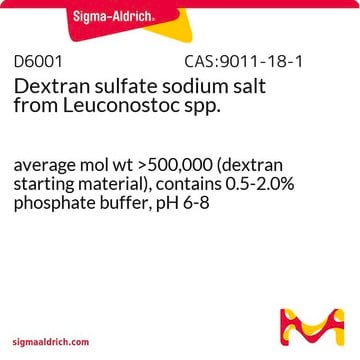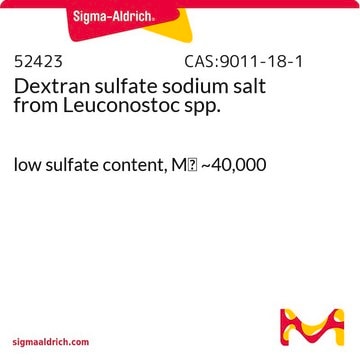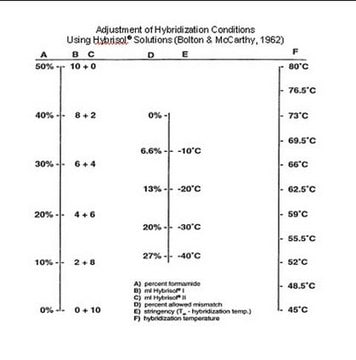75027
Dextran sulfate sodium salt
Synonym(s):
Sodium Dextran Sulfate
Sign Into View Organizational & Contract Pricing
All Photos(1)
About This Item
UNSPSC Code:
12352201
NACRES:
NA.25
Recommended Products
form
powder
mol wt
Mr ~4000
impurities
3-6% (sulfur content)
loss
≤10% loss on drying
color
colorless
useful pH range
6.0-8.0 (10 g/L)
solubility
H2O: 100 mg/mL, clear, colorless to faintly greenish-yellow
storage temp.
room temp
Looking for similar products? Visit Product Comparison Guide
General description
Dextran is a polymer of anhydroglucose. It is composed of approximately 95% alpha-D-(166) linkages. The remaining (163) linkages account for the branching of dextran.
Application
Dextran sulfate is routinely used for the selective precipitation of lipoproteins, probe hybridization membrane-immobilized DNA, the release of DNA from DNA-histone complexes, and the inhibition of RNA binding to ribosomes.
Biochem/physiol Actions
Dextran sulfate was able to inhibit the binding of platelet factor 4 to S aureus bacterial surface in a dose dependent manner.
Other Notes
To gain a comprehensive understanding of our extensive range of Dextrans for your research, we encourage you to visit our Carbohydrates Category page.
Storage Class
11 - Combustible Solids
wgk_germany
WGK 2
flash_point_f
Not applicable
flash_point_c
Not applicable
Certificates of Analysis (COA)
Search for Certificates of Analysis (COA) by entering the products Lot/Batch Number. Lot and Batch Numbers can be found on a product’s label following the words ‘Lot’ or ‘Batch’.
Already Own This Product?
Find documentation for the products that you have recently purchased in the Document Library.
Customers Also Viewed
Krystin Krauel et al.
Blood, 117(4), 1370-1378 (2010-10-21)
A clinically important adverse drug reaction, heparin-induced thrombocytopenia (HIT), is induced by antibodies specific for complexes of the chemokine platelet factor 4 (PF4) and the polyanion heparin. Even heparin-naive patients can generate anti-PF4/heparin IgG as early as day 4 of
Johannes Mehringer et al.
Physical chemistry chemical physics : PCCP, 23(2), 1381-1391 (2021-01-05)
Amphiphilic molecules (e.g. hydrotropes) that enhance the solubility of hydrophobic compounds in water are often charged. As a result, such compounds also show specific ion effects. These effects can either strengthen or weaken the solubilisation power of amphiphilic molecules, depending
Our team of scientists has experience in all areas of research including Life Science, Material Science, Chemical Synthesis, Chromatography, Analytical and many others.
Contact Technical Service